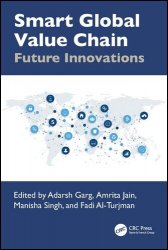Smart Global Value Chain: Future Innovations
- Добавил: literator
- Дата: 26-06-2024, 08:15
- Комментариев: 0
 Название: Smart Global Value Chain: Future Innovations
Название: Smart Global Value Chain: Future InnovationsАвтор: Adarsh Garg, Amrita Jain, Manisha Singh, Fadi Al-Turjman
Издательство: CRC Press
Год: 2025
Страниц: 292
Язык: английский
Формат: pdf (true)
Размер: 12.9 MB
Innovation is a critical facilitator in today’s fast-changing global value chain landscape. This book describes the interplay of technological breakthroughs enabling efficiency and intelligence within value chains, making them smart and sustainable. From service models and smart technologies to the application of smart global value chains across sectors, this book offers a unique insight into the transformational role of smart global value chains in bringing agility and sustainability to the global value chain ecosystem.
The term “smart networking” refers to the practice of leveraging digital resources to facilitate more productive interpersonal interactions. Building and maintaining professional relationships and accomplishing individual and organizational objectives require the use of a wide range of online platforms and applications, such as social media, messaging apps, and collaboration software. Smart networking is crucial for achievement in today’s digital age, be it in one’s personal life or one’s professional life. It is becoming increasingly necessary for individuals to be able to network and create relationships effectively online due to the growth of online platforms and the rising reliance on technology for communication. Connecting with more people from various backgrounds is a major advantage of intelligent networking. Machine Learning and Artificial Intelligence (AI) facilitators have started to be part of our daily lives and have significant effects on the rapid developments of the Internet of Things.
Mobile cloud computing (MCC) and the Internet of Things (IoT) have emerged as two transformative technologies that are reshaping the digital landscape. The widespread adoption of mobile devices and the proliferation of connected devices have created new opportunities and challenges for delivering efficient and scalable services in these domains. To address these challenges, service models tailored specifically for MCC and IoT applications have been developed.
The aim of this research is to explore and analyse the service models for MCC and IoT, with a focus on their characteristics, benefits, and use cases. By understanding these service models, we can better comprehend how they enable the deployment, management, and scalability of MCC and IoT applications. The first part of the research will provide an overview of service models and their significance in the context of MCC and IoT. Service models act as an abstraction layer between service providers and consumers, defining the roles, responsibilities, and interactions between the two parties. Understanding the different service models is crucial for selecting the most appropriate approach based on the specific requirements of MCC and IoT applications. Two common service models for MCC and IoT will be examined in detail: Infrastructure as a Service (IaaS) and Platform as a Service (PaaS). IaaS offers virtualized computing resources such as virtual machines, storage, and networking infrastructure, providing a foundation for hosting MCC and IoT applications. PaaS, on the other hand, provides a higher level of abstraction by offering a platform for application development and deployment, simplifying the development process and allowing developers to focus on the application logic.
This book is an essential guide for academics, industry leaders, and policymakers to navigate the future where smart technologies like Artificial Intelligence, Machine Learning, blockchain, Internet of Things, and beyond reshape the global economic landscape.
Скачать Smart Global Value Chain: Future Innovations
[related-news] [/related-news]
Внимание
Уважаемый посетитель, Вы зашли на сайт как незарегистрированный пользователь.
Мы рекомендуем Вам зарегистрироваться либо войти на сайт под своим именем.
Уважаемый посетитель, Вы зашли на сайт как незарегистрированный пользователь.
Мы рекомендуем Вам зарегистрироваться либо войти на сайт под своим именем.
